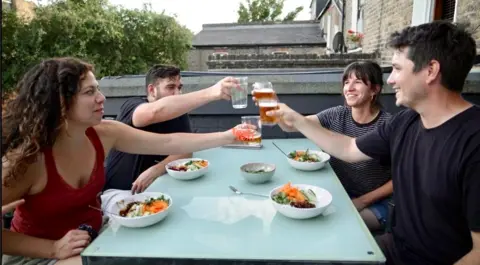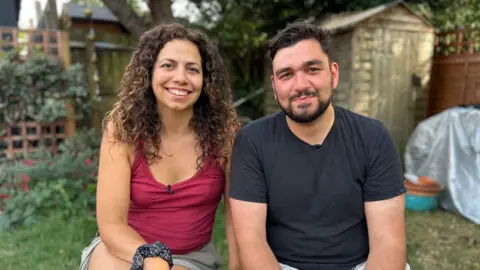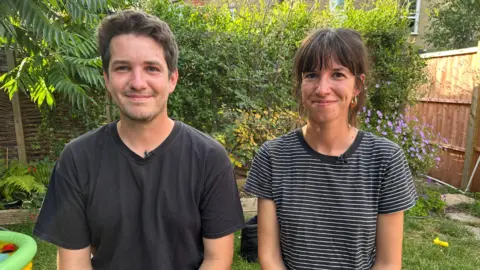Is buying with friends the answer to a tough housing market?
 BBC
BBCFour friends keen to get on the property ladder, but finding prices too steep, clubbed together to buy a home in London. Could this be the future of home ownership?
The two couples, now each with a baby, live together in a three-bedroom flat in north-east London.
Francesca, Graeme, Sonja and Kieran, all 34, have known each other since school and university, and lived together during the Covid pandemic until the landlord "doubled the rent overnight".
From moving in, to house renovations, to the women giving birth four months apart, how is it all working out?
Francesca, a musician, says when they all bought the flat together in 2022, she and her partner Graeme would not have been able to afford a suitable place in London on their own.
Graeme says they would have been able to afford a property in the £350,000-£400,000 price range - but by bringing all four incomes together, they could afford "a lot more". They ended up paying £650,000.
He says "apart from some estate agents being surprised", there were no massive hurdles to overcome to buy as two couples versus a sole couple.
They got a floating deed of trust, a legal document that outlines how ownership of a property is divided between joint owners.
Rise in non-traditional mortgages
The four friends are among a growing number of people with non-traditional mortgages.
Some of the UK's biggest lenders have reported trends in people co-buying with friends, siblings and parents.
Lloyds Bank said its research found half of young first-time buyers were willing to consider more non-traditional routes to be able to afford a home, while Barclays reported "a strong interest" in non-traditional mortgages this year.
Natwest head of mortgages Lloyd Cochrane said the bank was seeing "more and more customers think about different ways of getting on the housing ladder", but there was a need to raise awareness of non-traditional ways to get there.
Sales and marketing director at Fairview New Homes, Chris Hood, said that in the past two years they had seen an increase in the number of enquiries and sales from first-time buyers teaming up with friends or family members to purchase a home.
Part of the decision for Francesca, Graeme, Sonja and Kieran was that they wanted to stay close to their workplaces in London.
It helped they were already close friends and living together "so it didn't feel like such a big step", Francesca says.
"If anything, moving in just the two of us felt like a bigger step."
Kieran points out the couples have each been together for a decade, so they were "fairly confident" they would not to split up and "cause havoc".
Francesca and Sonja found another bonus, in that they spent a lot of their maternity leave together, which Sonja says "helped in a time that can be really lonely".

The two families share groceries, childcare and cooking - splitting all expenses four ways - and their two children get on "like siblings", according to all the parents.
The reaction from others has been positive, Kieran says.
"Whoever I tell about it, they always think it's a great idea and they like it," he says.
"But I do have to preface it with: 'It's not like a commune or anything. It's communal living.'"

SpareRoom, a UK-based website that specialises in flat-sharing and finding flatmates, recently conducted a survey on 6,524 flatmates and lodgers in the UK.
When asked how they planned to afford a deposit, of those who expected to buy a property, 89% said savings, 44% said they planned to team up with a partner, 25% said with financial help from friends or family, 17% said inheritance, 9% will team up with a sibling or parent, and 6% will team up with a friend.
Of the 14% who said they did not expect to be able to buy a property, almost half said it was because their family could not help with a deposit.
Things to consider
- The legal agreement or deed of trust
Adam French, consumer expert at Money Facts, said: "What happens if the mortgage cannot be paid, or for example one of you wants to move out? Having all of that crystal clear in writing is really important."
- Credit scores
Mr French said it was important to be "really transparent" about that one bad credit score or it could bring down the mortgage application.
- Other costs
Insurance and stamp duty will need paying. Having a plan and an agreement in place will help to make sure things go smoothly.

Friends Mirko, 37, and Lorenzo, 30, moved from Italy to London more than 10 years ago to work in casinos.
After nine years, realising they had spent £160,000 on rent between them, they pooled their salaries and bought a two-bedroom flat in Woolwich for £450,000 with a deposit of £90,000.
"We thought... why, instead of paying rent, don't we pay a mortgage?," Mirko says. "We've known each other so long, we trust each other. We can do that."
He says the bank told them it was more likely to give a mortgage to friends because "couples are more likely to split up".
"The bond you can have with a friend is bigger than a bond you can have in a relationship," Mirko says.
Lorenzo adds that "with the money of a two-bedroom flat in London, you can buy a villa with a swimming pool" in big Italian cities like Rome and Milan, and their parents are proud of what they have achieved because they know how expensive London is.
Mirko says he would recommend the set-up for "no more than two people" because it is difficult to find friends who think in the same way, but "if you find the right person, I think it's the right solution".
'I see huge value'
It has been three years since Sonja, Kieran, Francesca and Graeme moved in together, and the experience, they say, has "really worked" - although Kieron says he would not recommend it to everyone.
"You have to be confident with who you're living with and be very open with your finances and your family plans - and have a timeline," he says.
Sonja says she could see such an arrangement working throughout different stages of life.
"I think there's something sad when your networks narrow. I see huge value for this type of investment in retirement as well," she says.
"Who knows what the next stage is for us - whether we'll continue to live together or separate into different homes - but I'd really like to have some element of communal living in my life."
Additional reporting by Anna O'Neill
Listen to the best of BBC Radio London on Sounds and follow BBC London on Facebook, X and Instagram. Send your story ideas to [email protected]
